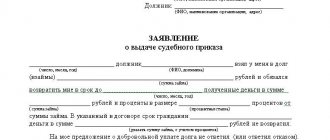A court order is a narrow but already well-trodden path in the system of strict rules of jurisprudence and the bureaucratic structure of the country. By applying to the magistrate with an application for issuing an order, you are guaranteed to receive a beautiful piece of paper within 5 days, which serves as a writ of execution.
It gives you the right to begin forced collection in order to properly “punish” the negligent debtor. Banks, microfinance organizations and collectors love to use an application for a court order, because this is the easiest way to the FSSP and debt repayment.
What should be contained in an application for a court order?
We have Art. 124 of the Code of Civil Procedure of the Russian Federation, which talks about the form and content of an application for a court order. It establishes the basic rules and requirements for the submitted document. Here they are:
- Name of the court, indication of the precinct number, full name of the magistrate.
- Full name or name of the collector, address, contact information and payment details.
- Full name, address of the debtor, his passport details and contacts, place of work, date of birth and identifier (optional: TIN or insurance number according to SNILS).
- Documentary evidence of authority, if the application is submitted by a representative of the claimant. As a rule, this is a power of attorney.
- Calculation of the amount of debt, indicating a specific monthly payment.
- References to legislation, loan agreement or other documents.
- Information that the debtor received notices of voluntary payment of debt.
- Calculation of penalties for penalties and other sanctions, if such a possibility is provided for in the agreement between the parties.
- List of documents that will be attached to the application.
Some documents are also attached to the application. If you send a bare statement to the court, you will be refused to consider it, since it will not be supported by documents.
In particular, you should attach:
- a copy of the debtor’s passport and identification data, which he provided when concluding the agreement;
- credit agreement or loan agreement;
- claims that you sent to the debtor;
- debt calculation;
- a duplicate of the application for a court order;
- confirmation from the Russian Post about receipt of documents by the debtor (for this it is necessary to send documents by registered mail);
- receipt of payment of state duty.
Please note that a state fee is also paid to the magistrate's court. But its size is 50% of the standard state duty for property-related requirements. According to the norms of Art. 333.21 of the Tax Code of the Russian Federation, this is 2-4%, depending on the amount of claims.
Completed sample application for a court order
Let's take an application form as an example.
Sample application for a court order
Before writing an application, you must familiarize yourself with the following rules:
- The calculation of the amount of debt can be presented directly in the application, as is done in the example provided. But you can put the calculations in a separate document. It is advisable to do this if the debtor partially paid, but then stopped making monthly payments.
- You must notify the debtor of your intention to apply for a court order. Therefore, before going to court, we send a copy of the application to the defendant.
- All documents that you send to the debtor must be sent by registered mail. This option allows you to obtain a certificate of receipt of the letter - these notifications from the post office must also be attached to the case materials.
(18.1 KB)
Specifics of writ proceedings
The specificity of writ proceedings is that the judge issues a judicial act solely on the basis of the documents presented by the claimant, which, in turn, must confirm the existence of the debtor’s obligation to the claimant, the indisputability of the claim and the fact of the debtor’s failure to fulfill this obligation.
An important feature of writ proceedings is that the application is considered:
- Single judge
- No trial
- Without calling the parties
As a distinctive feature of a court order, one can note its equivalence to a writ of execution, that is, a court order has the force of a writ of execution (part 2 of article 121 of the Code of Civil Procedure of the Russian Federation, part 3 of article 123.1 of the Code of Arbitration Procedures of the Russian Federation, part 2 of article 229.1 of the Arbitration Procedure Code of the Russian Federation).
A court order that has entered into legal force is subject to the provisions of the law on the mandatory nature of judicial acts throughout the entire territory of the Russian Federation (part 1 of article 13 of the Code of Civil Procedure of the Russian Federation, part 1 of article 16 of the CAS RF, part 1 of article 16, part 1 of article 319 Arbitration Procedure Code of the Russian Federation), as a result of which failure to comply with a court order entails liability established by federal laws.
The court examines only the documents submitted by the claimant.
In writ proceedings, the possibility of the court examining a different range of evidence other than the primary documents submitted by the claimant is completely excluded.
During the consideration of an application for a court order, the judge is not entitled to :
- request additional evidence
- call witnesses, experts, specialists, translators for questioning (questioning)
- involve third parties in the case
- call the parties and listen to their arguments
The indisputability of the claimant's claim in writ proceedings.
In legal proceedings for the issuance of a court order, the absence of a dispute regarding the claims stated by the claimant is presumed.
The indisputability of the claimant's claim is the condition under which a court case is subject to resolution on the merits by issuing a court order.
The indisputability of the claimant's claim must be confirmed by reliable written evidence recognized by the debtor.
It should be noted that in connection with the amendments made to Article 229.2 of the Arbitration Procedure Code of the Russian Federation by Federal Law No. 451-FZ of November 28, 2018, from October 1, 2019, when filing an application for a court order to the arbitration court, the claimant is not required to confirm the recognition and non-fulfillment debtor of his obligations . It is enough to present to the court documents establishing the debtor’s financial obligations.
If the documents reveal the debtor’s disagreement with the stated requirements, then the judge, having established the existence of a dispute about the right, issues a ruling to refuse to accept the application for the issuance of a court order (clause 3, part 3, article 125 of the Code of Civil Procedure of the Russian Federation, clause 3, part 3 Article 123.4 CAS RF, clause 3, part 3, Article 229.4 of the Arbitration Procedure Code of the Russian Federation).
In arbitration and administrative processes, the receipt of written objections from the debtor regarding the claims made against him before the issuance of a court order may also indicate the existence of a dispute.
Meanwhile, in civil proceedings, the debtor has the opportunity to apply for the cancellation of a court order only after it is issued.
The fact is that in arbitration and administrative proceedings the claimant is obligated by law to send or hand over to the debtor a copy of the application for the issuance of a court order with attachments before filing it with the court (part 4 of article 229.3 of the Arbitration Procedure Code of the Russian Federation and part 3 of article 123.3 of the CAS RF). This allows the debtor to state his disagreement with the demand presented to him before the court order is issued, which, in turn, allows the judge to refuse to accept the application for the issuance of a court order due to the contentiousness of the stated demand.
Unfortunately, the Civil Procedure Code of the Russian Federation does not provide for such additional guarantees of observance of the debtor’s rights in writ proceedings, therefore, the debtor learns about the issuance of a court order upon receiving a copy of this judicial act, after which he has 10 days at his disposal, during which he has the right to implement the law granted to him the possibility of filing objections to the court order, which, in turn, entails the cancellation of the court order by the judge who issued it.
Practice on court orders: why and when can consideration be refused?
An important requirement that applies to all claims for a court order is the indisputability of the claims. You cannot, for example, go to the magistrate’s court to recover 300 thousand rubles from the neighbor who flooded you.
In such a situation, if you only have evidence of material damage caused to wallpaper and equipment, but there is no confirmation of contractual obligations, the magistrate’s court will refuse to consider the case and issue an order.
Again, you cannot go to court to a magistrate if you have a non-property claim. For example, you want to recover moral damages or we are talking about copyright violations. Magistrates' courts do not deal with such processes.
We propose to consider some examples from existing practice in magistrates' courts. Why are plaintiffs denied consideration of applications for forced collection of debt:
- Case No. 2-37/2020, which was considered by the magistrate of judicial district No. 1 of Belgorod. The magistrate's court returned the application for forced collection of the debt. The reason is trivial and very common: the lender forgot to attach the loan agreement to the document. That is, the statement was not supported by documents.
- In case No. 2-41/2018, the magistrate court of judicial district No. 2 in the same city returned the application on the promissory note. The court saw signs of a dispute in the case - under such circumstances, a court order is not issued. Subsequently, the plaintiff filed a private complaint against the judge, but the appellate court agreed with the initial conclusions.
- In case No. 9-2949/2020, the magistrate court of precinct No. 1 in the Astrakhan region expanded the application because it did not contain information about the debtor. The creditor did not bother to indicate the passport details or identification of the person against whom he made a debt claim. It is worth calling the refusal of the magistrate court justified, since in the absence of identification it is not possible to issue an order.
- In case No. 15-17/2019, the court returned the application for an order. The reason was that the receipt for payment of the state duty did not indicate the purpose of the payment. More precisely, the document indicated that the state fee is paid for consideration of the application for the issuance of an order. But the judge was not satisfied with this argument. He noted that the payer did not indicate the case number and details, or other identification data.
The latest refusal, according to experts, raises doubts. The fact itself has been fulfilled - the applicant transferred funds to the budget. This fact is documented. The court received the original order.
You can remember Art. 124 of the Code of Civil Procedure of the Russian Federation, which establishes rules for the content of statements and documents. In turn, paragraph 18 of the Resolution of the Plenum of the Supreme Court No. 62 allows for the submission of documents for an order in written and electronic form. There are no specific requirements to indicate the case number and details anywhere.
An application for a court order is a convenient alternative to legal proceedings
Applications for orders are sent to the Magistrates' Court. In particular, this type of collection is loved by microfinance organizations, banks, and debt collectors. Individuals often apply for it with promissory notes. It is not difficult to write an application, but still, sometimes the courts refuse. The main reasons for refusals are the lack of legal documents, technical errors and the presence of an ongoing dispute between the parties.
What procedural rules are not applicable in writ proceedings?
As noted above, the magistrate or arbitration court examines the application for a court order and the attached documents for compliance with the established procedural rules, and if relevant violations are identified, returns the application to the recoverer or refuses to accept it, and in the absence of procedural violations, resolves the case on the merits by issuance of a court order. The law does not provide for the application of other procedural rules in writ proceedings.
- An application for the issuance of a court order cannot be left without consideration by the court.
- The judge does not have the right to make a ruling to refuse to issue a court order
- Order proceedings cannot be terminated
- The judge cannot take interim measures in the case
- Writ proceedings exclude the possibility of filing counterclaims against the claimant and their acceptance by the court
- In writ proceedings there is no stage of preparing the case for trial
- In writ proceedings, procedural rules governing the stage of the trial are not applied.
- The case regarding the issuance of a court order cannot be completed by reconciliation of the parties; any conciliation procedures are not applicable in writ proceedings
It should be noted that the prohibition on the use in writ proceedings of the above-mentioned norms in force in claim proceedings is enshrined in the imperative norm of Part 7 of Art. 229.5 of the Arbitration Procedure Code of the Russian Federation, and taking into account the explanations contained in the Resolution of the Plenum of the Supreme Court of the Russian Federation of December 27, 2021 No. 62, this norm is subject to application by analogy in writ proceedings carried out during civil proceedings (Part 4 of Article 1 of the Code of Civil Procedure of the Russian Federation). If issues arise during writ proceedings that are not directly regulated by the norms of the CAS RF, magistrates also have the right to apply the appropriate norm by analogy with the law to resolve them (part 4 of article 2 of the CAS RF).
Court order: what should the debtor do?
In the case of claim proceedings, everything is easier and clearer for the debtor. The creditor follows the pre-trial procedure, writes a statement of claim, a copy of which is sent to the debtor; applies to the district court with documents.
Next, a date is set for the first meeting, to which both parties are summoned. In general, such processes last 2-4 months: meetings are postponed, extended, and the parties file petitions for extensions. The procedure is delayed for other reasons.
But if we are talking about a court order, it is already more complicated. The order is as follows:
- The creditor first follows the pre-trial procedure and then prepares an application.
- A copy is sent to the defendant.
- The plaintiff applies to the court for a court order.
- The case is considered within 5 days.
- Next, the judge issues a court order.
- A copy of the order is sent to the debtor. He has 10 days to file an objection and to send the case to a court of general jurisdiction.
As a rule, debtors do not know about the order until the very end. For many reasons, people do not receive letters from the court. They face problems when the FSSP imposes restrictions.
Let us remind you that if within 10 days the debtor has not sent an objection to the magistrate’s court, then the creditor has the right to apply for the initiation of enforcement proceedings to the FSSP. Next, the bailiffs use various measures to carry out the order.
What do the bailiffs do to carry out the order:
- freeze the debtor's accounts;
- restrict his right to cross the territory of the Russian Federation;
- withdraw money from monthly income;
- property is seized and so on.
If you receive a court order, you need to act immediately. How to proceed:
- We write an objection to the court order in free form. You can write a standard statement by hand stating that you do not agree with the creditor’s claims and ask for a refusal. But the application must indicate the number and details of the order received.
- We direct this objection to the magistrate's court, which issued the order.
It is important not to miss deadlines. But even if you found out about the order, say, 2 months later, there are still chances to challenge the decision. If, for example, you have been on a business trip all this time or have been in hospital treatment, this will allow you to obtain a cancellation.
You will need to submit an application for a copy of the court order (if you never received it) and, based on the document received, write an application to restore the deadlines. And then - to the objection.
Sample documents
Information for citizens » Sample documents Dear users of the Internet portal!
The samples of procedural documents presented on the Internet portal are exemplary, are not of an official nature, and must be adjusted and clarified by the person drawing up the procedural document, depending on the individual circumstances of a particular case.
The magistrate, when deciding whether to accept a statement of claim or an application for a court order for his proceedings in each specific case, has the right to indicate in the established procedural order the need to provide additional information and (or) documents, copies of documents.
We also draw your attention to the fact that, in accordance with the recommendations of the Cabinet of Ministers of the Council of Europe dated 05.14.1981 No. R (81) 7 and dated 09.11.1995 No. R (95) 12, Federal Law dated 06.26.1992 No. 3132-1 “ On the status of judges in the Russian Federation", Federal Law dated December 22, 2008 No. 262 "On ensuring access to information about the activities of courts in the Russian Federation", Resolution of the Plenum of the Supreme Court of the Russian Federation dated May 31, 2007 No. 27 courts, in order to avoid violation of the principle of equality of parties , does not have the right to provide legal advice on the application of legislation and give legal advice on the merits of the case.
- Requirements for the form and content of documents submitted to the court
- Statement of claim for divorce
- Application for a court order for the collection of alimony
- Statement of claim for division of property
- Statement of claim for the exchange of defective goods (for termination of the sales contract and recovery of the amount paid)
- Statement of claim for compensation for damage caused by a crime
- Statement of claim for debt collection under a loan agreement
- Statement of claim for compensation for damage caused by flooding of an apartment
- Statement of claim for compensation for damage caused by a traffic accident
- Application for a court order to collect debt under a loan agreement
- Application for a court order to recover accrued but not paid wages to an employee
- Private complaint against the ruling of a magistrate in a civil case
- Appeal against the decision of the magistrate in a civil case
- Appeal against the verdict of the magistrate
- Complaint against a decision in a case of an administrative offense
- Application for deferment or installment payment of state duty, reduction of its amount
- Application for approval of the settlement agreement
- Application for recusal
- Application for cancellation of a court decision in absentia
- Application for termination of proceedings in connection with the abandonment of the claim
- Application for postponement of proceedings (suspension of proceedings) in the case
- Application for securing evidence
- Comments on the minutes of the court session
- Objection to a court order in a civil case
- Objection to a court order in an administrative case
- Application for issuance of a duplicate writ of execution
- Application for the return of a document attached to a court case
- Application for familiarization with the case/material
- Application for a copy of a judicial act
- Application for a copy of an audio recording of a court hearing
- Application (petition) for video recording and broadcast of a court hearing in a civil case
- Application (petition) for video recording and broadcast of a court hearing in a criminal case
- Application (petition) for video recording and broadcast of a court hearing in a case of an administrative offense
Form and content of the statement of claim
The statement of claim is submitted to the court in writing.
The statement of claim must indicate: 1) the name of the court to which the application is submitted; 2) the name of the plaintiff, his place of residence or, if the plaintiff is an organization, its address, as well as the name of the representative and his address if the application is submitted by a representative; 3) the name of the defendant, his place of residence or, if the defendant is an organization, its location; 4) what is the violation or threat of violation of the rights, freedoms or legitimate interests of the plaintiff and his demands; 5) the circumstances on which the plaintiff bases his claims and evidence confirming these circumstances; 6) the price of the claim, if it is subject to assessment, as well as the calculation of the collected or disputed amounts of money; 7) information about compliance with the pre-trial procedure for contacting the defendant, if this is established by federal law;
7.1) information about the actions taken by the party (parties) aimed at reconciliation, if such actions were taken;
 list of documents attached to the application. The application may indicate telephone numbers, fax numbers, email addresses of the plaintiff, his representative, the defendant, other information relevant to the consideration and resolution of the case, as well as the plaintiff’s requests.
list of documents attached to the application. The application may indicate telephone numbers, fax numbers, email addresses of the plaintiff, his representative, the defendant, other information relevant to the consideration and resolution of the case, as well as the plaintiff’s requests.
The statement of claim is signed by the plaintiff or his representative if he has the authority to sign the statement and present it to the court.
The statement of claim shall be accompanied by: 1) a document confirming the payment of the state duty in the established manner and amount or the right to receive a benefit in the payment of the state duty, or a petition for a deferment, installment plan, a reduction in the amount of the state duty or an exemption from paying the state duty;
2) a power of attorney or other document certifying the authority of the plaintiff’s representative;
3) documents confirming the implementation of the mandatory pre-trial dispute resolution procedure, if such a procedure is established by federal law;
4) documents confirming the circumstances on which the plaintiff bases his claims, copies of these documents for defendants and third parties, if they do not have copies;
5) calculation of the amount of money being recovered or disputed, signed by the plaintiff, his representative, with copies in accordance with the number of defendants and third parties;
6) notification of delivery or other documents confirming the sending to other persons participating in the case, copies of the statement of claim and documents attached to it, which other persons participating in the case do not have, including in the case of filing a statement of claim and attached documents with the court documents to it by filling out a form posted on the official website of the relevant court on the Internet;
7) documents confirming that the party (parties) have taken actions aimed at reconciliation, if such actions have been taken and the relevant documents are available.
Civil Procedure Code of the Russian Federation, articles 131, 132.
Form and content of an application for a court order in civil proceedings
An application for a court order must be submitted in writing.
The application for a court order must indicate: 1) the name of the court to which the application is submitted; 2) the name of the claimant, his place of residence or location; 3) the name of the debtor, his place of residence or location, and for a citizen-debtor also the date and place of birth, place of work (if known);
4) the claimant’s claim and the circumstances on which it is based; 5) documents confirming the validity of the claimant’s claim; 6) list of attached documents.
In the case of a claim for movable property, the application must indicate the value of this property.
An application for a court order is signed by the claimant or his representative having the appropriate authority. The application submitted by the representative must be accompanied by a document certifying his authority.
A court order is issued if: the claim is based on a notarized transaction; the claim is based on a transaction concluded in simple written form; the claim is based on a protest of the bill of exchange made by the notary for non-payment, non-acceptance and undated acceptance; a claim has been made for the collection of alimony for minor children, not related to establishing paternity, challenging paternity (maternity) or the need to involve other interested parties; a claim has been made for the recovery of accrued but not paid wages to the employee, vacation pay, dismissal payments and (or) other amounts accrued to the employee; a territorial body of the federal executive body responsible for ensuring the established procedure for the activities of courts and the execution of judicial acts and acts of other bodies has declared a demand for the recovery of expenses incurred in connection with the search for the defendant, or debtor, or child;
a demand was made for the recovery of accrued but not paid monetary compensation for the employer’s violation of the established deadline for payment of wages, vacation pay, dismissal payments and (or) other payments due to the employee;
a claim was made for the collection of arrears in payment for residential premises, expenses for major repairs and maintenance of common property in an apartment building, utilities, and communication services;
a demand was made for the collection of debt on obligatory payments and contributions from members of a real estate owners' association and a consumer cooperative.
Civil Procedure Code of the Russian Federation, articles 122, 124.
Form and content of an application to initiate a criminal case of private prosecution
Criminal cases regarding crimes provided for:
part one of Article 115 of the Criminal Code of the Russian Federation (intentional infliction of minor harm to health, causing short-term health disorder or minor permanent loss of general ability to work);
Article 116.1 of the Criminal Code of the Russian Federation (battery by a person subject to administrative punishment);
Part one of Article 128.1 of the Criminal Code of the Russian Federation (slander, that is, dissemination of knowingly false information discrediting the honor and dignity of another person or undermining his reputation),
are initiated against a specific person by submitting an application to the court by the victim or his legal representative, with the exception of cases provided for in paragraph 2 of part one and part four of Article 147 of the Criminal Procedure Code of the Russian Federation.
In the event of the death of the victim, a criminal case is initiated by filing an application by his close relative or in the manner established by part three of Article 318 of the Criminal Procedure Code of the Russian Federation.
The application must contain: 1) the name of the court to which it is submitted; 2) a description of the crime event, place, time, as well as the circumstances of its commission; 3) a request addressed to the court to accept the criminal case for proceedings; 3.1) information about the victim, as well as documents proving his identity; 4) information about the person brought to criminal liability; 5) a list of witnesses who must be summoned to court; 6) signature of the person who submitted it.
The application is submitted to the court with copies according to the number of persons against whom a criminal case of private prosecution is being initiated. The applicant is warned of criminal liability for knowingly false denunciation in accordance with Article 306 of the Criminal Code of the Russian Federation, about which a note is made in the application, which is certified by the signature of the applicant. At the same time, the magistrate explains to the applicant his right to reconciliation with the person against whom the application was filed.
From the moment the court accepts the application for its proceedings, on which a decision is made, the person who filed it is a private prosecutor. The rights provided for in Articles 42 and 43 of the Criminal Procedure Code of the Russian Federation are explained to him, about which a protocol is drawn up and signed by the magistrate and the person who filed the application.
If, after accepting the application for proceedings, it is established that the victim, due to a dependent or helpless state or for other reasons, cannot defend his rights and legitimate interests, then the magistrate has the right to recognize the participation in the case of the legal representative of the victim and the prosecutor as mandatory.
Criminal Procedure Code of the Russian Federation Article 318
Information published as of November 1, 2019.







